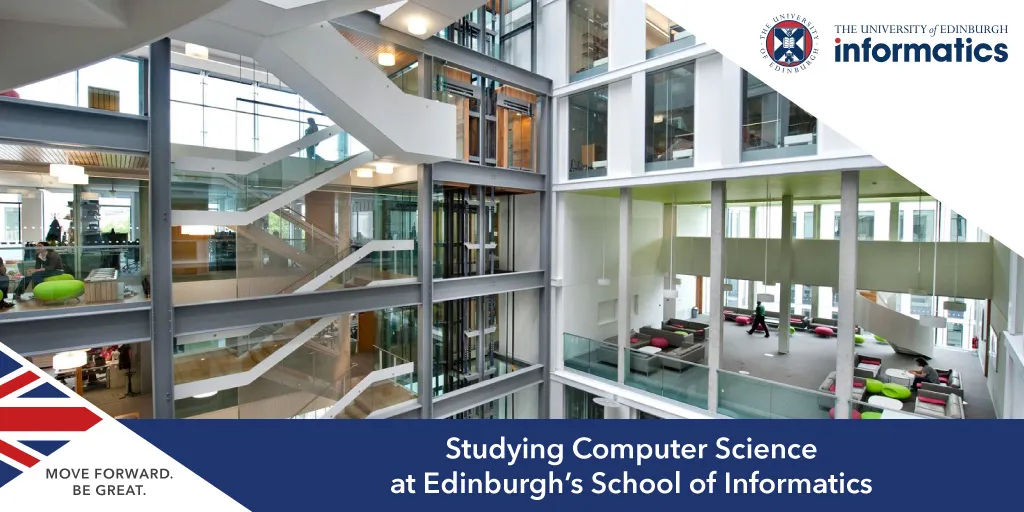Computer science is a multidisciplinary field that explores both the theoretical and practical aspects of computing. It encompasses the study of computer hardware and software, covering a broad range of specialised areas such as artificial intelligence, cryptography, computer engineering, and software development.
The University of Edinburgh is known worldwide for its computer science expertise, and its MSc in Computer Science teaches you about designing, analysing, making, and using computer systems. It's not just about one computer; it's about everything from tiny parts to massive internet networks.
If you like thinking and learning about how computers work, modules are available on:
- Algorithms (fancy computer rules)
- Programming languages (how we talk to computers)
- Cryptography (keeping secrets safe)
- Quantum informatics (super advanced computer science)
The programme imparts a strong foundational understanding of theory and equips students with diverse practical skills suitable for various career paths. Edinburgh's Computer Science MSc is a gateway to a world of computational possibilities.

Why Study MSc in Computer Science at the University of Edinburgh?
1. Dynamic course structure and modules
The MSc in Computer Science at the University of Edinburgh is structured around two taught semesters and a final project, with various study options available. In the full-time one-year programme, students undertake lectures, tutorials, projects, and written assignments during the first two semesters, while also learning research methods. The final project and dissertation are completed during the summer.
For the two-year part-time option, students split their taught credits between the first and second years and then focus on the final project in the second-year summer. A three-year part-time option spreads the project over a third year. Course schedules are flexible due to the diverse courses offering contact times at various hours throughout the week.
The curriculum includes core computer science areas like parallelism, security, programming languages, theoretical computer science, and quantum informatics. Examples of courses include Advanced Database Systems, Blockchains, Distributed Systems, and Quantum Computing. Additionally, students can choose from courses in artificial intelligence, software engineering, and social and biological computation to tailor their education to their interests.
2. Accessible entry requirements
Applicants to the University of Edinburgh's MSc in Computer Science must hold a UK 2:1 honours degree or its international equivalent in informatics, computer science, or mathematics. They must also demonstrate English language proficiency with a minimum PTE Academic score of 70 (with 62 in each component) or an IELTS Academic score of 7.0 (with no component below 6.5).
3. Edinburgh's global ranking and reputation
The University of Edinburgh excels in computer science and information systems, securing a 4th place ranking in the UK according to the Guardian University Guide 2024, further solidifying its reputation as the 14th-best university in the UK. The university also shines globally, standing at the 20th position in the QS World University Rankings by Subject 2024 for Computer Science and Information Systems.
5. Great facilities
The University of Edinburgh offers students access to state-of-the-art facilities in the School of Informatics' primary teaching building, Appleton Tower. Situated in the heart of the University's Central Area, this purpose-built facility provides dedicated spaces for learning and teaching.
Students benefit from outstanding IT resources, including computer labs with over 250 high-spec machines. A team of dedicated computing staff fully supports these labs, ensuring a seamless and productive learning experience. The Informatics Student Support Team is conveniently located within the Informatics Teaching Organisation in Appleton Tower for additional support and guidance.
6. Student Experience
The student experience at the University of Edinburgh is enriched by a vibrant and diverse community of approximately 100,000 students, lending the city a unique energy. The university offers flexible programmes, world-class facilities, and award-winning support services, ensuring an exceptional and distinctive educational journey.
- Clubs and Societies: The university boasts many clubs and societies, providing students with opportunities to nurture their interests, connect with like-minded peers, explore hobbies, or socialise.
- Volunteering: Volunteering opportunities abound, allowing students to make a meaningful impact and pursue personal goals not solely aimed at those seeking a career in the nonprofit sector.
- Sport and Exercise: Edinburgh is one of the UK's premier sports universities, offering top-notch facilities and opportunities for students to engage in various sports and physical activities.
- Accommodation: The university guarantees accommodation offered to eligible undergraduate students from outside Edinburgh, ensuring a comfortable and secure living environment.
- Facilities and Support: A wide range of facilities and support services are available to cater to the needs of undergraduate students, enhancing their learning and overall university experience. Edinburgh offers a holistic and enriching environment for students to thrive.
7. Plenty of available scholarships
The School of Informatics at The University of Edinburgh offers various scholarships and funding opportunities to support students pursuing their academic and research aspirations in the field of informatics:
- Informatics Global PhD Scholarships: These scholarships are available to highly motivated individuals with a strong academic record at the undergraduate or master's level. If selected, you can receive a full PhD scholarship to pursue your doctoral studies in the School of Informatics.
- School of Informatics Scholarships: Each year, the School of Informatics provides several scholarships for new postgraduate research students. These scholarships support students in their research endeavours within the School.
- UKRI Doctoral Training Funds: Up to ten full scholarships are offered annually for each Centres for Doctoral Training within the School of Informatics. These funds support students pursuing doctoral research in various informatics fields.
- Google European Doctoral Fellowships: Google conducts an international competition for these prestigious fellowships. Successful applicants receive funding to pursue their doctoral studies, contributing to cutting-edge research in informatics.
- John Fisher High Performance (HPC) Scholarships: These scholarships aim to foster the development of the High-Performance Computing (HPC) workforce by funding outstanding students pursuing a Master's in HPC or HPC with Data Science.
- DeepMind Scholarships: In partnership with DeepMind, the School of Informatics offers scholarships to students in the MSc in Artificial Intelligence programme. These scholarships cover tuition fees, provide a stipend for living expenses, and offer equipment and travel grants. International recipients may also receive a relocation grant.
8. Taught by experienced faculty members
A distinguished faculty of experts teach the MSc in Computer Science at the University of Edinburgh. Their diverse expertise spans various computer science domains, including artificial intelligence, data science, cybersecurity, and software engineering. As dedicated educators and researchers, they provide students with an excellent education, ensuring that graduates are well-prepared to excel in the dynamic and evolving field of computer science.
9. Career prospects
Graduates from the MSc in Computer Science programme at the University of Edinburgh can look forward to diverse career opportunities thanks to their specialised, advanced skills in developing, constructing, and managing advanced computer systems. Here are five promising career paths:
- Software Engineer/Developer: Graduates can embark on careers as software engineers or developers, designing and building cutting-edge software applications, systems, and solutions for companies across various industries.
- Data Scientist/Analyst: With a strong theoretical foundation and practical experience, they can pursue roles as data scientists or analysts, extracting valuable insights from data to inform business decisions and strategies.
- Cybersecurity Specialist: As cybersecurity concerns continue to grow, graduates can become experts in securing computer systems and networks, protecting sensitive information, and defending against cyber threats.
- Research Scientist/Academic: Some graduates may choose to further their academic pursuits or enter research roles, contributing to advancements in computer science through academic institutions or research organisations.
- IT Project Manager: With skills in system development and management, IT project managers can lead IT projects and ensure their successful planning, execution, and delivery within organisations.
10. Promising salary expectations
After completing an MSc in Computer Science in the UK, entry-level positions typically offer £35,000 to £45,000 annually. At the same time, experienced software development and data science professionals can earn well above £70,000, possibly reaching six figures. Specific skills and job demands also affect salary levels.
FAQ
What is the acceptance rate for the MSc Computer Science at the University of Edinburgh?
The acceptance rate for most postgraduate courses at the University of Edinburgh is 46%.
What is the minimum GPA for Edinburgh University?
The University of Edinburgh seeks students with a robust academic profile, requiring a minimum high school GPA of 3.3. Strong grades (B+ or above) in relevant honours and AP classes are also expected.



 I sincerely thank SI-UK for getting me accepted to UCL. The MSc in Urban Development and Planning is extremely competitive, but the right guidance provided by SI-UK made my dream of studying at University College London a reality. The services were exceptional from beginning to end.
I sincerely thank SI-UK for getting me accepted to UCL. The MSc in Urban Development and Planning is extremely competitive, but the right guidance provided by SI-UK made my dream of studying at University College London a reality. The services were exceptional from beginning to end. 

